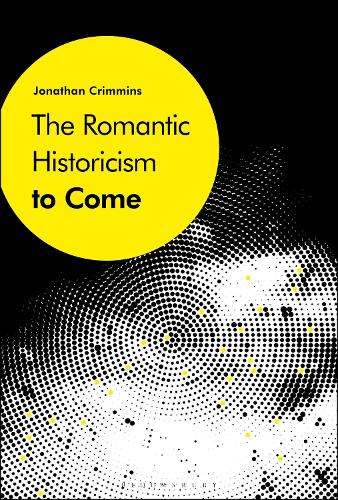
The Romantic Historicism to Come
(Hardback)
Publishing Details
The Romantic Historicism to Come
By (Author) Dr. Jonathan Crimmins
Bloomsbury Publishing PLC
Bloomsbury Academic USA
19th April 2018
United States
Classifications
Adult Education
Non Fiction
Literary theory
History of ideas
901
Physical Properties
Hardback
192
Width 152mm, Height 229mm
431g
Description
Vacillating between the longue dure and microhistory, between ideological critique and historical sympathy, between the contrary formalisms of close and distant reading, literary historians operate with such disparate senses of what the term history means that the field risks compartmentalization and estrangement. The Romantic Historicism to Come engages this uncertainty in order to construct a more robust, more capacious idea of history. Focusing attention on Romantic conceptions of historys connection to the future, The Romantic Historicism to Come examines the complications of not only Romantic historicism, but also our own contemporary critical methods: what would it mean if the causal assumptions that underpin our historical judgments do not themselves develop in a stable, progressive manner Articulating history's minimum conditions, Jonathan Crimmins develops a theoretical apparatus that accounts for the concurrent influence of the various sociohistorical forces that pressure each moment. He provides a conception of history as open to radical change without severing its connection to causality, better addressing the problem of the future at the heart of questions about the past.
Reviews
Reflecting on liberalism's impasse--in which, as Crimmins notes, the promise of freedom has invariably resulted in waves of violence--Crimmins rescues Shelley from familiar arguments about his impotent idealism by suggesting that his 'affective politics' point the way to a future that is a praxis of care. * Review 19 *
In this timely study, Jonathan Crimmins challenges the fundamental premise of historicism that history is a series of closed totalities characterized by discontinuity and rupture. Anchored in probing close readings of an impressive range of Romantic-era literary and philosophical works, from Kants 'Idea for a Universal History' and Hegels Phenomenology to Scotts Waverley and Mary Shelleys Frankenstein, The Romantic Historicism to Come argues that mediation is not an obstacle to historical understanding but its very condition. What Crimmins proposes will be of interest beyond as well as within Romantic studies: a way beyond the impasse represented by the conflicting contentions of historicist and formalist criticism. * Nicholas Halmi, Professor of English and Comparative Literature, University of Oxford, UK *
The Romantic Historicism to Come strikingly reorients the conceptions of history we have inherited from the Romantic age. As against our prevailing sense of history as an elusive phenomenon always already 'lost' to us (an absent cause, or inaccessible structure), Jonathan Crimmins accounts for history as that which remainspersisting in and as the varied media that become the material conditions of the future, and embodying the multiple times or 'intervals' that are the substance of an experience not so neatly divided between past, present, and future as we have often imagined. * Timothy Campbell, Associate Professor of English, University of Chicago, USA *
Author Bio
Jonathan Crimmins is Assistant Professor at the University of Virginias College at Wise, USA. His previous work can be found in Essays in Romanticism, Studies in Romanticism, Nineteenth-Century Literature, and Diacritics. He is currently at work on a new project about 18th-century British Harlequinades.
